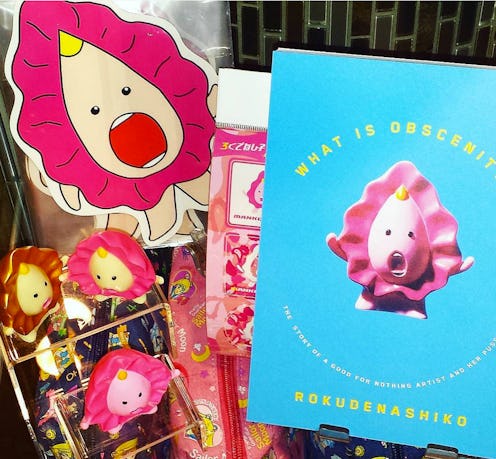Life
Art Celebrating Womanhood Ruled As "Not Obscene"

It’s hard to imagine anyone not loving these adorable 3D vagina figures, but these toys, which go by the name of “manko-chan,” have recently caused controversy in Japan. They were the objects of obscenity charges by Japanese authorities, but the vagina figurines were ruled officially as not obscene by a Japanese court on Monday. The ruling is only a partial victory for artist Megumi Igarashi; although she was cleared of obscenity charges for the figurines, she was found guilty of obscenity for distributing digital data of her vagina. The controversy has sparked an ongoing debate about freedom of expression, obscenity, and the definition of art in Japan.
Igarashi, who also goes by the name Rokudenashiko (“good-for-nothing girl” in English), was arrested and jailed for a brief period in July of 2014 on charges of obscenity, and then arrested again in December of that year. Female genitalia figures heavily in her work, in the “manko-chan” figures (“manko” is a Japanese word for “vagina”), as well as in playful sculptures. She used crowdfunding to fund a project in which she took a 3D scan of her own genitals and used it to create a vulva-shaped kayak; she sent the data for the 3D model of her vagina to donors.
Igarashi first started creating her vulva-themed artworks as a joke, but became more serious and political about it when her work inspired a critical backlash. “I thought it was just funny to decorate my mold pussy and make it a diorama,” she explained in an online post, “but I was very surprised to see how people get upset to see my works or even to hear me say Manko. … Manko, pussy, has been such a taboo in the Japanese society.” Midori Yamamura, a Japanese professor of Asian art, said of Igarashi’s work in a documentary for Broadly, “We are not very used to feminist art but what she is doing is very feminist because she became quite political, and she is really trying to change people's perceptions about vaginas.”
On Monday, a Tokyo court ruled that Igarashi’s cute vulva figurines are not obscene, and that they can, instead, be regarded as “pop art.” One of Igarashi’s lawyers, Takashi Yamaguchi, said of the ruling, “This verdict is extremely rare,” and described it as having “high historic value.”
Igarashi was not cleared of all charges, however. She was found guilty of distributing digital data of obscene material (referencing the data she sent to donors of the 3D scan of her genitals), and ordered to pay $3,700, half the amount that prosecutors originally sought. At a press conference after the ruling, Igarashi said she was “20-percent happy” about being cleared on some of the charges, but insisted that she was “completely innocent.” According to Reuters, she displayed some of her “manko-chan” figures for the press and said, “I am of course indignant. I will appeal and continue to fight in court.”
Igarashi’s legal battle has spurred debate in Japan about obscenity and artistic freedom. Critics have argued that the policing of images of female genitalia promotes a double standard, as well as an inconsistent view of sexuality. Pornography is a hugely prolific market in Japan, but genitals usually have to be pixelated out in pornographic films. Some have also pointed out that, at the same time that Igarashi has been prosecuted for showing images of female genitalia, images of male genitalia are much less taboo. In fact, Kawasaki, Japan, hosts an annual event known as the “Festival of the Steel Phallus” to celebrate fertility and the penis, in which people parade giant penis shrines through the streets.
Igarishi has recently published a book in English, titled What Is Obscenity? , in which, through manga, she discusses her ordeal with the police and legal system, as well as her development as an artist.
Images: Page & Panel/Instagram (2)